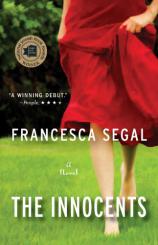Author Talk: June 8, 2012
Francesca Segal’s debut novel, THE INNOCENTS, follows Adam, who has been dating his fiancé Rachel for 13 years and has become tightly integrated into her close-knit Jewish family and their London community. But when Rachel’s alluring cousin, a model, reappears in his life, he begins to question everything. In this interview, Segal shares how the idea for the book came to her and talks about Edith Wharton’s THE AGE OF INNOCENCE, on which the novel is based.
Question: While Edith Wharton’s Pulitzer Prize-winning novel provided you with a plot, what difficulties or challenges did you encounter when attempting to reimagine this story? What led you to retell this story in a new time and place?
Francesca Segal: I’d read THE HOUSE OF MIRTH when I was about twelve and barely remembered it, and I think I tried the odd Henry James around the same time and had struggled a bit. But whenever I’m trying to get under the skin of a place, I read its writers --- I discovered Rushdie, who’s now one of my favorite writers, on a press trip to India --- and a few years ago when I was living in New York, I went back to James and to Wharton. And I just fell in love. I think THE AGE OF INNOCENCE was the sixth or seventh of hers I read in succession, and so by the time I reached it, I was familiar with some of her central preoccupations --- the opposition of the individual and the group; the vulnerability of women in all social strata; the disparity between the declared motivations and the deeper currents that stir human society, whether it was her own, upper class world satirized so exquisitely in a novel like THE HOUSE OF MIRTH and THE REEF, or an entirely different milieu in tales like SUMMER or ETHAN FROME.
I would never have chosen to start, spontaneously, with a classic on which to base a novel of my own --- the self-consciousness and fear of comparison would have held me back. But I didn’t really have a choice, in the end. It just happened, almost from the moment I started reading THE AGE OF INNOCENCE; a portrait of a world entirely removed from my own era or experience that nonetheless felt instantly, immediately familiar, with all the support systems and pressures and judgments and long-interwoven lives. It was, I think, the one and only moment when a large cartoon lightbulb pinged on above my head like Roadrunner. I read that glorious opening scene at the new opera house, in which all of Old New York high society is assembled to hear Faust. And it just seemed immediately obvious --- it was just like going to synagogue on the High Holidays. After that, I simply had to do it. I had always known that I had certain ideas about life in a small, suburban community that I wanted to explore, and suddenly I had the perfect vehicle for them.
Q: The tone at the end of your novel is less bleak and more optimistic than that of THE AGE OF INNOCENCE. What do you feel are the most important differences between Wharton’s novel and your own?
FS: I had a slightly different message from Wharton. THE AGE OF INNOCENCE is already less scathing and condemnatory than THE HOUSE OF MIRTH written fifteen years before. But still --- it’s pretty damning. I wasn’t willing to condemn North West London in quite the same way, nor did I believe it fair to suggest that the fulfillment of Adam’s life would be that ‘his days were full, and they were filled decently. He supposed it was all a man ought to ask’. Newland Archer has a loveless, emotionally sterile marriage with May Welland, and his only consolations are society and status. And even the value of these is subtly undermined by the liberations of the next generation --- Newland’s son Dallas is in love with Julius Beaufort’s daughter Fanny and therefore is doing precisely what society long before had believed would mark the apocalypse --- ‘marrying Beaufort’s bastards’. But it’s not the apocalypse --- it no longer matters. They’re marrying, unimpeded, for love. Newland and Ellen were thirty years too early for their love affair. And it is explicitly stated that they are the grand loves of each other’s lives. In that way, my novel is very different. I didn’t want it to be clear-cut.
I would never tell a reader whether I believe Adam’s decision was right or wrong in terms of their future together beyond the book --- I’d love to know what conclusions people draw by themselves, actually. But yes, in either case, my message is far less categorical and more optimistic than Wharton’s.




